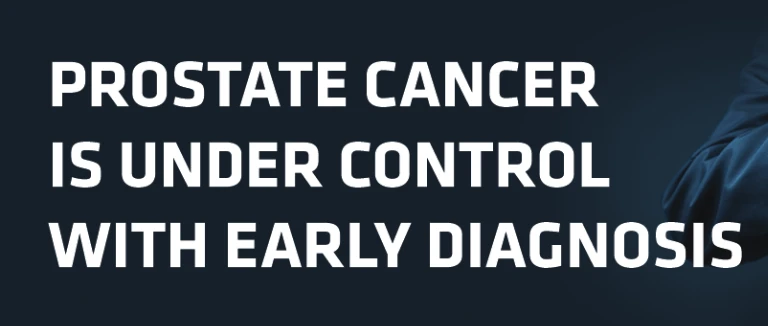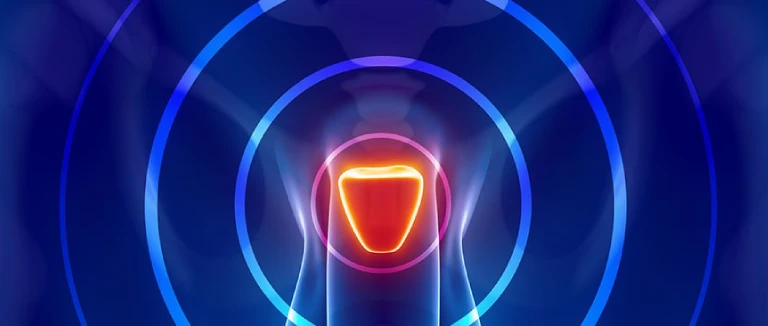The prostate is a male organ that surrounds the urethra, the tube carrying urine out of the body. Conditions such as prostate enlargement (BPH) or prostate cancer can restrict urine flow, causing discomfort and difficulty urinating. Treatment options depend on the type and severity of the condition. For mild cases like benign prostatic hyperplasia or inflammation, medication can help relieve symptoms. More serious issues, such as prostate cancer, may require treatments including radiation, chemotherapy, or surgery. In Turkey, advanced diagnostic and treatment options for prostate disease are available, with care provided by experienced medical specialists.
What is Prostate?
The prostate is a male gland located just below the bladder, surrounding the lower part of the urinary tract. Positioned between the penis and rectum, it is an essential part of the reproductive system. The prostate connects the bladder to the urethra and produces secretions that help form semen.
How Is Prostate Treatment?
Prostate problems are treated using a variety of methods, depending on the specific symptoms and severity. In Turkey, prostate disease is managed by skilled specialists with extensive experience. Treatment options are selected based on the type of prostate condition and may include:
- Prostatitis: Prostatitis is an inflammation of the prostate and can cause symptoms such as difficulty urinating, frequent urination, pelvic pain. There are different treatment options such as antibiotics, anti-inflammatory drugs, hot water baths, pelvic floor exercises, and other alternative methods.
- Prostate enlargement: The enlargement of the prostate can cause blockage in the urinary tract, making it difficult to urinate. Drug therapy includes medications that help shrink the prostate. Prostate enlargement can be treated with different methods, such as surgery or laser.
- Prostate Cancer: Because prostate cancer is a slowly progressing type of cancer, it is carefully monitored at the beginning of the disease without starting any treatment. There are different treatment options available, such as radiation therapy, chemotherapy, surgical intervention, hormone therapy and immunotherapy.
How Is the Prostate Treatment Process Performed?
Prostate diseases vary in type and severity, so treatment plans are tailored to each individual's condition and overall health. In general, the prostate treatment process involves the following steps:
- Performing the necessary examinations and examinations for diagnosis
- Determination of treatment options and selection of treatment method
- Starting treatment applications
- Regular implementation of follow-up and controls
What Are the Things to Be Considered for Prostate Treatment?
During prostate treatment, there are several key points patients should keep in mind:
- Regular use of medications in accordance with the treatment plan
- Not interrupting the regular check-ups recommended by your doctor
- Adopting a healthy lifestyle
- Talking to your doctor about what you can do about the side effects seen during treatment
- Receiving psychological support to make it easier to cope with a serious illness such as prostate cancer
- Having follow-ups to monitor the likelihood of recurrence of the disease after prostate cancer treatment
- Not being exposed to the cold air
Who Gets Prostate Disease?
Prostate disease affects men of all ages but becomes increasingly common with age. Prostatitis, or inflammation of the prostate, most often occurs in men between 30 and 50 and is typically caused by sexually transmitted or urinary tract infections. A family history of prostate problems or a diet high in fat may also increase the risk of developing prostate disease.
What are the Symptoms of Prostate Disease?
Symptoms of prostate disease can vary based on the specific condition and its severity. Common signs to watch for include:
- Frequent urination
- Difficulty urinating
- Blood in the urine
- Weak flow of urine
- Inability to urinate
- Urinary incontinence
- Urinary tract infections
- Sexual dysfunction disorders
What are the sub-categories of Prostate Disease?
All men are at risk for prostate-related diseases. Some conditions, like inflammation or enlargement, are often manageable with medication and may not be serious. However, others”such as prostate cancer”can be more severe and require advanced treatment. Common prostate diseases include:
- Prostatitis
- Prostate enlargement (Benign prostatic hyperplasia)
- Prostate cancer

What is Prostate Cancer?
Prostate cancer occurs when abnormal cells in the prostate gland grow and multiply uncontrollably. It is generally slow-growing, so early stages often present no symptoms. As the disease progresses, signs may include difficulty urinating, blood in the urine or semen, and pain or stiffness in the pelvic area. A major risk factor is having a family history of prostate or breast cancer.
How Is Prostate Treatment?
The best treatment for prostate cancer depends on factors like age, overall health, and how advanced the cancer is. Common treatment options include:
- Follow-up
- Surgical intervention
- Radiation therapy
- Hormone therapy
- Chemotherapy
- Immunotherapy
How Should Nutrition Be in the Prostate Cancer?
Good nutrition plays a vital role in managing prostate cancer and supporting treatment success. Key dietary recommendations for patients include:
- Creating a diet consisting of fresh fruits and vegetables, whole grains, low-fat proteins
- Avoiding high-fat foods such as fatty meats, full-fat dairy products and processed foods
- Paying attention to consuming antioxidant-rich foods
- Consuming plenty of liquids such as water and herbal tea to reduce urinary tract symptoms and facilitate the flow of urine
- Paying attention to taking enough vitamin D
The Use of Radiation Therapy in the Treatment of Prostate Cancer
Radiation therapy is a common treatment for prostate cancer that uses high-energy radiation to target and destroy cancer cells or halt their growth.

Side Effects of Radiation Therapy in the Treatment of Prostate Cancer
Radiation therapy can effectively treat prostate cancer, but it may cause side effects such as difficulty urinating, reduced sexual function, fatigue, intestinal issues, and skin irritation. Most of these effects are temporary and tend to improve after treatment ends.
Radiation Therapy for Prostate Cancer Treatment
Radiation therapy is a key method for treating prostate cancer, using high-energy rays to destroy or control cancer cells. There are two main types:
External beam radiation: High-energy rays are delivered from a machine outside the body, precisely targeting the prostate.
Brachytherapy: Radioactive materials are placed directly into the prostate tissue, delivering radiation from within.
Both techniques are designed to kill cancer cells effectively while minimizing damage to surrounding healthy tissue.
Does Prostate Cancer Cause Bleeding in Radiation Therapy?
Radiation therapy can sometimes cause damage to the prostate and nearby tissues, such as the urinary tract or rectum. This may lead to side effects like bleeding, especially in the surrounding organs.
Side Effects of Radiation Therapy in Prostate Cancer
Possible side effects of radiation therapy include fatigue, urinary symptoms, skin irritation, sexual difficulties, and digestive issues. Fortunately, most of these effects are temporary and tend to improve after treatment is completed.
Side Effects of Hormone Therapy in Prostate Cancer
Hormone therapy is often used to slow or stop the growth of prostate cancer cells, but it can lead to certain side effects. Common side effects may include:
- Weakening of the bones
- Weight gain
- Breast growth and tenderness
- The risk of diabetes
- The risk of heart disease
- Sexual dysfunction
- Hot flashes
- Psychological effects
- Fatigue
What is Prostate Enlargement?
Prostate enlargement, known medically as BPH (benign prostatic hyperplasia), occurs when the prostate gland grows larger but remains noncancerous. This enlarged gland can press against the urinary tract, making urination difficult. BPH is especially common in older men. While it is not a serious health threat, it can significantly affect quality of life by causing bothersome urinary symptoms.
How Is the Treatment for Prostate Enlargement?
Treatment options for prostate enlargement commonly include medication and surgical procedures. Medications can help relieve symptoms and slow or stop the progression of prostate growth. In more severe cases or when medications aren't effective, surgery may be performed to remove or shrink the enlarged prostate.
Experienced Prostate Doctors in Turkey
Early diagnosis makes prostate problems much easier to treat. Turkey is a global leader in health technology, making it a safe and reliable destination for prostate care. At Liv Hospital, prostate screenings and treatments are carried out by distinguished experts in the field. Contact us to learn more about our prostate treatment options and discover the unique advantages of being treated in Turkey. From your initial call to completing your treatment, the Liv Hospital International Health Services Team will support you every step of the way.
* Liv Hospital Editorial Board has contributed to the publication of this content .
* Contents of this page is for informational purposes only. Please consult your doctor for diagnosis and treatment. The content of this page does not include information on medicinal health care at Liv Hospital .
For more information about our academic and training initiatives, visit Liv Hospital Academy
Frequently Asked Questions
Among the frequently asked questions in prostate treatment may include the following:
Which department treats prostate treatment?
Urology specialists are usually consulted for the diagnosis and treatment of prostate disorders.
How is carob flour used in the treatment of prostate?
Carob flour can be consumed by adding it to meals or drinks to relieve the symptoms of prostate enlargement.
Is balsam pear useful in prostate treatment?
Although it is thought that balsam pear may be useful for prostate treatment, there is not enough scientific evidence about this subject yet.
Pumpkin seeds for herbal treatment of prostate
The zinc, magnesium, iron, vitamin E and antioxidants found in pumpkin seeds can help relieve the symptoms of prostate enlargement.
